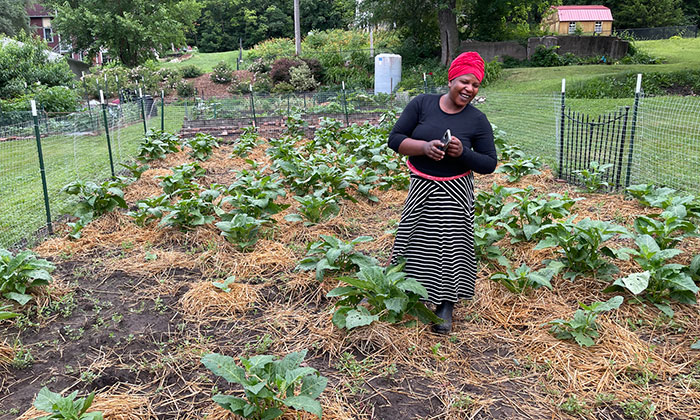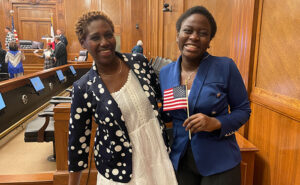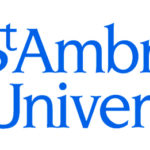
Refugee Evangeline Ndagijimana looks over a crop of African eggplant, or intoryi, near Cafe on Vine in Davenport.
By Lindsay Steele
The Catholic Messenger
Local refugee resettlement advocates are cautiously optimistic that a new government program allowing private groups to sponsor refugees could help more vulnerable families worldwide find a place to call home.
Welcome Corps, unveiled by the State Department last month, “has the potential to be a very good thing that could welcome more refugees and help people to see immigrants in a positive light,” said Laura Fontaine, executive director of World Relief Quad Cities. However, “there are a lot of unknowns as to how this will be in practice.” The program’s success, and the safety of the refugees, will depend on accountability, proper training and “people not getting in over their heads if they are new to this.” World Relief Quad Cities is the only U.S. refugee resettlement partner within a 130-mile radius.
“I think Welcome Corps opens up opportunities for groups of individuals who are interested in welcoming refugees to determine if this is a good fit,” said Ann McGlynn, executive director of Tapestry Farms in Davenport. The nonprofit offers a “long welcome” to refugees who need additional support. Welcome Corps gives organizations like hers an opportunity to do more.
Under U.S. law, a refugee is an individual forced to flee their home country due to persecution or a well-founded fear of being persecuted because of their nationality, race, religion, political opinion or membership in a particular social group. Refugees do not voluntarily choose to migrate but do so because of civil unrest or violence. The U.S. Conference of Catholic Bishops (USCCB) reports that more than 63 million people worldwide have been forced out of their homes, a number that grows by about 34,000 people each day.
The Catholic Church views assisting those in need as “a fundamental Christian duty that is derived directly from the life of mercy of Christ, who himself was an immigrant and a child of refugees. We as Christians are called to welcome our new neighbors with the same love and compassion we would want ourselves to be shown,” the USCCB website states.
How Welcome Corps can help
Groups of at least five individual American citizens or permanent resident adults may apply to Welcome Corps to privately sponsor the resettlement of refugees in the United States, the Department of State said in a Jan. 19 press release. Private sponsors must independently raise funds and directly provide essential assistance to refugees for their first 90 days in the new community. This assistance includes helping refugees find housing and employment, enrolling children in school and connecting refugees to essential services in the community.
The U.S. allowed more than 25,000 refugees into the country in fiscal year 2022, using only 20% of 125,000 refugee spots allocated by the Biden administration. State Department officials cited the COVID-19 pandemic and limits set by the previous administration for the discrepancy.
In the first year of Welcome Corps, the State Department will seek to mobilize 10,000 Americans to step forward as private sponsors and offer a welcoming hand to at least 5,000 refugees. To ensure private sponsors are vetted, trained and monitored, the State Department is funding a consortium of nonprofit organizations with expertise in welcoming, resettling and integrating refugees into U.S. communities to support Welcome Corps.
Groups do not need to identify a particular refugee in their application; the Welcome Corps team will match sponsors with refugees selected for resettlement to the United States. Later this year, groups will have the opportunity to identify refugees for referral to the U.S. Refugee Admissions Program for resettlement, and to support the refugees they have identified.
Accountability is essential
Community-based resettlement was the standard before passage of The Refugee Act of 1980, which put U.S. resettlement agencies like World Relief Quad Cities in charge of welcoming refugees. Lack of sponsor training and checks and balances led to refugees being trafficked or having challenging transitions, Fontaine believes. She heard horror stories from a refugee who came to the United States before 1980 and now works in refugee resettlement. “She came over from Armenia as a child and sat in a house without food for three days and watched rats run across the floor waiting for the sponsor to come back. She and her mom eventually started walking the streets of Chicago to find help, and this is just one of many, many stories.” Fontaine is hopeful that Welcome Corps safeguards will help lead to positive and successful resettlement for new refugees. Private sponsor groups will exist in addition to, and not replace, U.S. resettlement agencies.
The State Department has been experimenting with co-sponsorship models over the past year with refugees from Ukraine and Afghanistan. Communities in Muscatine and Kewanee, Illinois, have

Hope Nduhura and Chantal Maombi of Davenport celebrate taking their oath of citizenship in 2022 at the federal courthouse in Davenport.
partnered successfully with World Relief Quad Cities to welcome refugee families from these countries, Fontaine said.
The Muscatine group includes members of Ss. Mary & Mathias Parish and other faith communities. Deacon Kent Ferris, diocesan director of Social Action, believes anyone desiring to undertake a Welcome Corps effort in their community “would do well to take a field trip and meet with the community leaders in Muscatine who have epitomized the spirit of welcoming, made so remarkable during these dark times of war.”
Committing to community
McGlynn said groups interested in Welcome Corps should take time to determine if refugees will find employment, housing and medical care in their community. Groups must be willing to advocate for the refugees and offer support to community infrastructures. “Refugees are able to work as soon as they get here; utilizing that capacity to work and make money is the best-case scenario. There are some really good employers (in eastern Iowa) that have really stepped up when it comes to understanding what, I think, are simple accommodations that can be made to hire people who really want to work. It can be done.”
Sponsors assist refugees for 90 days but self-sufficiency takes more time. They may still need support for years, Fontaine said. McGlynn said groups should recognize that reality and ensure that refugees feel included in a supportive community that can meet their needs. “If you say you’re going to welcome a family, I think you have to understand that (this) commitment means working through the hard things together and celebrating the beautiful things together. It’s like being part of any community! There’s good and bad that happens. But, you weather it together.”
Fontaine encourages people interested in Welcome Corps to “go into it with open eyes” and take advantage of training opportunities. If a group is passionate about helping refugees but private sponsorship is not a good fit, “I’d love to have them as co-sponsors here, where they can still have the full support of World Relief.”
For more information on Welcome Corps or to become a private sponsor, visit www.welcomecorps. org To learn about co-sponsorship opportunities, contact Fontaine at LFontaine@wr.org.











